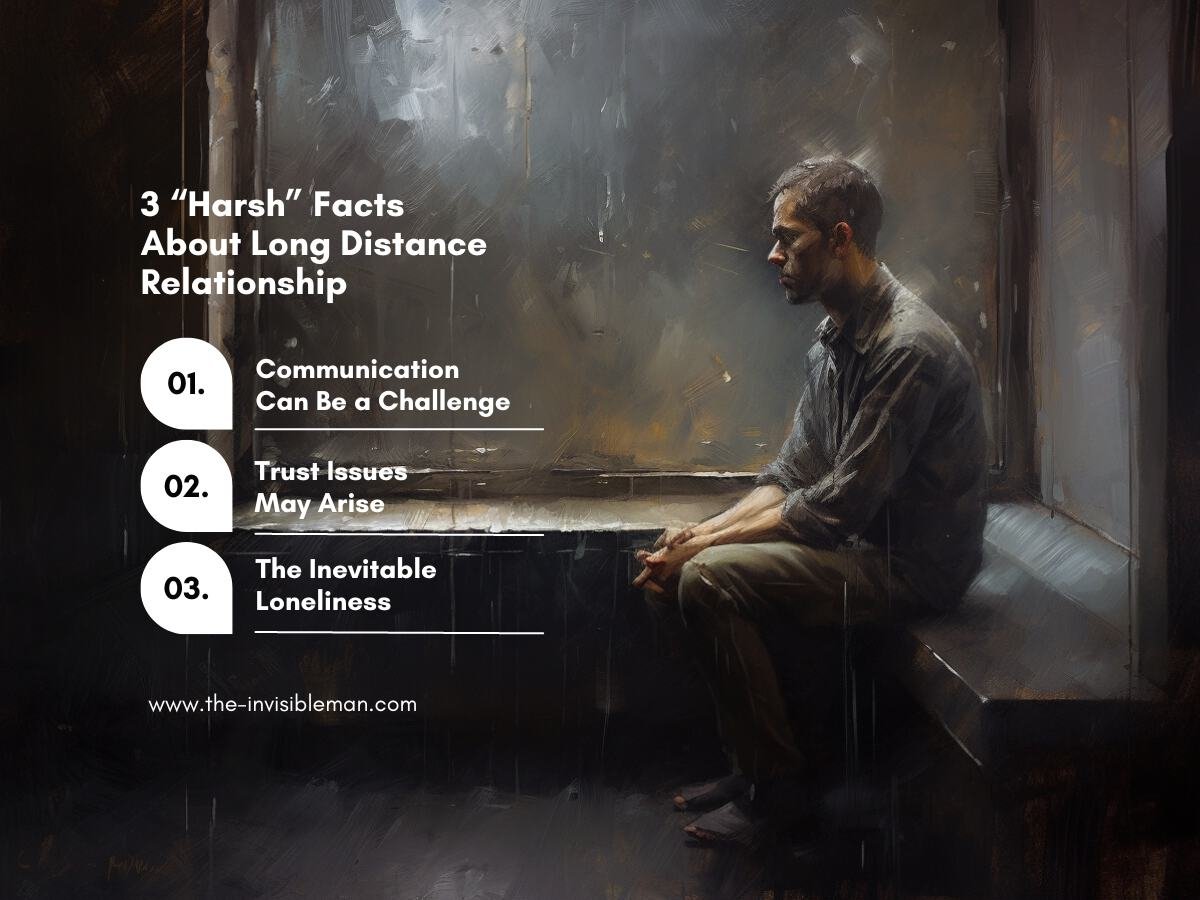3 Harsh Facts About Long-Distance Relationships You Believe
Table of Contents Show
A. Facts About Long Distance Relationships
Contrary to popular belief, long-distance relationships (LDRs) are not a modern phenomenon. They have been a part of human society for centuries, often necessitated by various pursuits such as trade, exploration, military expeditions, and more recently, education and career opportunities. These relationships, maintained through handwritten letters and infrequent reunions, were a testament to human resilience and the power of emotional connection.
In the contemporary world however, the narrative around LDRs has shifted. The rise of individualistic societies and the emphasis on physical proximity in relationships have painted LDRs as a significant ordeal, viewing them as challenging and emotionally taxing. This perspective fails to acknowledge the historical prevalence of such relationships and the strength they can engender.
In reality, LDRs have always been a part of the human experience. They have shaped our history, influenced our literature, and continue to impact our lives. The challenges they present are not new; they are simply viewed through a modern lens.
As we navigate our increasingly globalized world, perhaps it's time to embrace the long-standing tradition of a long-distance relationship and the unique strengths it can foster.
B. The 3 “Harsh” Facts About LDR Everyone Falls For
1. Communication Can Be a Challenge
The modern world, with its instant messaging, video calls, and social media platforms, has given us the illusion of closeness, hasn't it? We've been led to believe that communication is as simple as pressing a button. But let's strip away the veneer of convenience and delve into the raw truth: communication, especially in long-distance relationships, can be a Herculean task.
In the realm of long-distance relationships, communication becomes a double-edged sword. On one hand, it's the lifeline that connects two hearts across miles; on the other, it's a minefield of misunderstandings and misinterpretations. The absence of nonverbal cues, the nuances of tone, the subtleties of body language – all are lost in the digital translation.
A study on long-distance relationships revealed that couples often struggle with finding things to talk about. The same conversations, the same topics, over and over again, leading to a dry spell that can be as arid as the Sahara desert. But, isn't this a reflection of our primal roots? Our ancestors, the hunter-gatherers, didn't have the luxury of constant communication. They had to rely on trust, patience, and the strength of their bond.
The modern narrative would have you believe that this lack of communication is the cause for your failed relationship. But I challenge this notion. I argue that this challenge is not a pitfall, but an opportunity. An opportunity to strengthen your bond, to build trust, to learn patience. An opportunity to prove that your love is not shallow, not dependent on constant validation, but deep, resilient, and enduring.
Communication is just not just about quantity, but quality. It's not about filling every silence with words, but about making every word count. It's about understanding that silence is not always a void, but sometimes a bridge that connects two souls more profoundly than words ever could.
2. Trust Issues May Arise
Trust, the cornerstone of any relationship, becomes a slippery slope in long-distance relationships. The modern narrative makes you believe that trust issues are inevitable in LDRs. The lack of physical proximity, they say, breeds suspicion and insecurity.
Trust issues are not exclusive to long-distance relationships. They are a reflection of our individual insecurities and past experiences. They arise when there is no shared purpose, no common goal that binds the relationship together.
According to Talkspace, a leading platform for online therapy, trust issues often stem from past experiences or relationships, causing negative emotions like doubt and insecurity. But does this mean that trust issues are a given in LDRs? Absolutely not.
In the grand scheme of things, trust issues are a manifestation of a lack of purpose in the relationship. When two individuals are aligned in their goals, when they are working towards a shared vision, trust issues become irrelevant. The focus shifts from petty insecurities to the grander objective that impacts both.
Our ancestors, who often had to endure long periods of separation, understood this. They knew that the purpose of their relationship was not just companionship, but survival. They trusted each other not because they were physically together, but because they shared a common goal.
3. The Inevitable Loneliness
Loneliness, the modern-day plague. It's the demon that haunts every long-distance relationship.
In our hyper-individualistic society, we've been conditioned to seek constant companionship, to crave undivided attention from our partners. But isn't there a saying, "familiarity breeds contempt"? Could it be that this constant companionship, this incessant need for attention, is what's actually causing relationships to break?
As the latest psychology finally understands that loneliness and the psychological effects in a long-distance relationship is more about your mindset and attitude towards life than the relationship itself. It's about embracing solitude, about finding joy in your own company, about using the time apart to grow as an individual.
Inadvertently our ancestors acknowledged this. The lengthy travel and time apart allowed for personal growth, for self-discovery. Modernity would have you believe that loneliness is a death sentence for your relationship. But I challenge this notion. I argue that loneliness is not a pitfall, but an opportunity.
C. So, What Actually Kills Long Distance Relationships Then?
While we've been challenging the narrative of long-distance relationships, it's only fair to acknowledge the pitfalls that can, indeed, lead to their demise.
Here are nine factors that can potentially extinguish the flame of a long-distance relationship:
1. Not Closing the Distance
A long-distance relationship should ideally be a temporary situation. If there's no plan or effort to eventually close the distance, it can lead to feelings of hopelessness and frustration.
2. Lack of a Shared Vision
A shared vision or purpose for the future is the glue that holds a long-distance relationship together. Without it, the relationship can lack direction and meaning.
3. Insecurities
Insecurities can be a silent killer in any relationship, but they can be particularly destructive in long-distance ones. When not addressed healthily and productively, insecurities can breed mistrust and create a chasm between partners.
4. Different Expectations
When partners have different expectations from the relationship, it can lead to dissatisfaction and resentment. It's crucial to have open and honest discussions about what each partner expects from the relationship.
5. Infidelity
Infidelity is a deal-breaker in any relationship. In long-distance relationships, the temptation can be even greater due to the physical distance between partners. Honesty and loyalty are paramount in maintaining trust in a long-distance relationship.
6. Boredom
When partners start finding joy in other aspects of life and neglect their relationship, it can lead to a sense of disconnect. It's important to keep the spark alive by finding ways to enjoy each other's company, even from a distance.
7. Lack of Effort and Attention
A relationship requires constant effort and attention from both partners. When one or both partners stop putting in the effort, the relationship can quickly deteriorate.
8. Unhappiness
Unhappiness in a relationship can stem from various factors. If a partner is unhappy and the root cause is not addressed, it can lead to the end of the relationship.
9. Inconsistent Communication
Communication is the lifeline of a long-distance relationship. Inconsistent communication can lead to misunderstandings and feelings of disconnect.
So, while long-distance relationships can indeed be challenging, they are not doomed to fail. By acknowledging and addressing these potential pitfalls, couples can strengthen their bond and navigate the challenges of a long-distance relationship together.
D. 6 Tips For Long Distance Relationship
In the face of these harsh realities and reasons, how does one navigate the tumultuous seas of long-distance relationships?
Here are six unconventional strategies, rooted not in clichéd advice, but in the perspective that long-distance relationships can, in fact, be a catalyst for growth.
1. Embrace the Loneliness
Loneliness is not a pitfall, but a stepping stone towards self-discovery. Use this time to explore your interests, to cultivate your hobbies, to grow as an individual. Remember, a relationship is a union of two individuals, and the stronger the individuals, the stronger the relationship.
2. Foster a Shared Vision
A shared vision, a common goal, is the glue that holds a long-distance relationship together. It shifts the focus from petty insecurities to the grander objective that impacts both. Discuss your goals, align your visions, and work towards them together. It could be anything from building a house together to traveling the world.
3. Quality Over Quantity
In communication, quality trumps quantity. It's not about filling every silence with words, but about making every word count. It's about understanding that silence is not always a void, but sometimes a bridge that connects two souls more profoundly than words ever could.
4. Trust the Process
Trust is not a product of physical proximity, but of shared purpose and mutual understanding. It's about believing in each other's commitment to the relationship and the shared vision you are working towards.
Trust the process, trust your partner, trust yourself, all three which require one to learn how to be mature in a long distance relationship.
5. Celebrate the Space
Space, often viewed as a challenge in long-distance relationships, can be a blessing in disguise. It allows for personal growth, for self-discovery. It gives you the opportunity to miss your partner, to appreciate them more. Remember, familiarity breeds contempt, but distance makes the heart grow fonder.
6. Close The Distance
The ultimate goal of any long-distance relationship should be to close the distance. Long-distance relationships are not meant to be permanent. They are a temporary arrangement, a means to an end. The end being the day when you and your partner can finally be together, in the same place, at the same time.
E. Conclusion
In human relationships, long-distance relationships are not the aberrations of our modern era, but a testament to the timeless human capacity to come together, to connect, to endure. They are not the harbingers of loneliness, mistrust, and communication breakdowns, but the crucibles in which these very challenges are transformed into opportunities for growth, for self-discovery, for forging deeper connections. These highs and lows of long distance relationships are not unique to it and part of any form of bond.
After all, we all recognize the timeless quote that dismisses the harsh realities of long distance relationship:
“Distance only makes the heart grow fonder”
Yes, long-distance relationships can be hard, fraught with challenges that can seem insurmountable. But it is not the distance that kills a relationship. It is stagnation, the lack of a shared vision, the absence of a concerted effort to 'kill the distance'. It is the failure to communicate, to trust, to embrace loneliness.
In the end, it is not the distance that defines a relationship, but the love that bridges it.




















